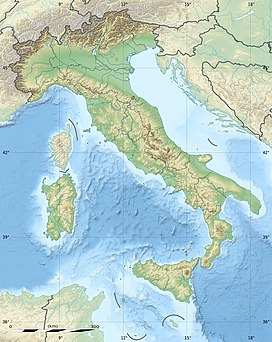Monte Civetta
| Monte Civetta | |
|---|---|
 | |
| Highest point | |
| Elevation | 3,220 m (10,560 ft) |
| Prominence | 1,454 m (4,770 ft)[1] |
| Listing | Alpine mountains above 3000 m |
| Coordinates | 46°22′48″N 12°03′12″E / 46.38000°N 12.05333°E |
| Geography | |
| Parent range | Dolomites |
| Climbing | |
| First ascent | 1855 |
Monte Civetta (3,220 m) is a prominent and major mountain of the Dolomites, in the Province of Belluno in northern Italy. Its north-west face can be viewed from the Taibon Agordino valley, and is classed as one of the symbols of the Dolomites.[2]
The mountain is thought to have been first climbed by Simeone di Silvestro in 1855, which, if true, makes it the first major Dolomite peak to be climbed. The north-western face, with its 1,000-metre-high cliff, was first climbed in 1925 by Emil Solleder and Gustl Lettenbauer. It is historically considered the first "sixth grade" in six-tier scale of alpinistic difficulties proposed by Willo Welzenbach (corresponding to 5.9).[3] Thirty years later UIAA used this as a basis for its grading system.
The famed Svan mountain climber Mikhail Khergiani died in a climbing accident on Monte Civetta in 1969.[4]
In 2013, a large tower of the NW side collapsed from Cima Su Alto. Nobody was in the wall or the hiking route below at the time.[5] In 2022, Reinhold Messner who had been climbing there in the 1990s described the spot, where the 400 m high, 50 m deep and 100 m wide tower broke off.[6]
References
[edit]- ^ "Monte Civetta". Peakbagger.com. Retrieved 13 January 2015.
- ^ "Monte Civetta - summitpost.org". summitpost.org. Retrieved 13 January 2015.
- ^ Scott, Doug (1981). Big Wall Climbing. Oxford University Press. pp. 27–33. ISBN 978-0195202700.
- ^ "Альпинисты Северной столицы. ХЕРГИАНИ МИХАИЛ ВИССАРИОНОВИЧ". www.alpklubspb.ru. Retrieved 2020-04-30.
- ^ ALESSANDRO BAÙ (2013-11-21). "Civetta, rock fall on Su Alto in the Dolomites". PlanetMountain.com. Retrieved 2024-02-26.
- ^ deutschlandfunkkultur.de, Ernst Vogt (2022-12-18). "Bergsteigen und Klimawandel - Das Risiko klettert mit". Deutschlandfunk Kultur (in German). Retrieved 2024-02-26.
External links
[edit]

